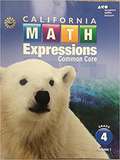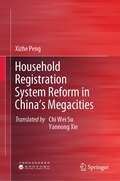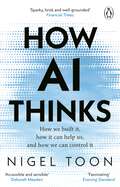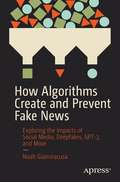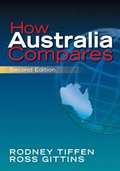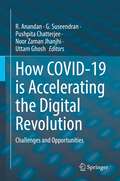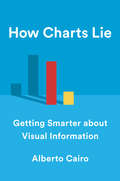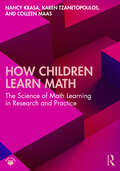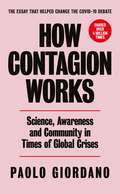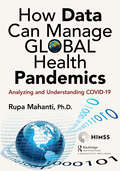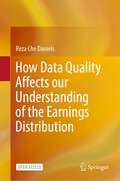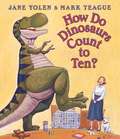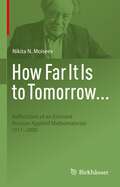- Table View
- List View
Houghton Mifflin Harcourt California Math Expressions Grade 4, Volume 1
by Karen C. FusonCALIFORNIA MATH Expressions Common Core GRADE 4 Volume 1 by Dr. Karen C. Fuson. This material is based upon work supported by the National Science Foundation.
Houghton Mifflin Harcourt Go Math!: Sbac Test Prep Student Edition Grade K (Houghton Mifflin Harcourt Go Math! Ser.)
by Houghton Mifflin Harcourt StaffCommon Core Assessment consortia have developed assessments that contain item types beyond the traditional multiple-choice format. This allows for a more robust assessment of children’s understanding of concepts. Common Core assessments will be administered via computers; and Getting Ready for the Smarter Balanced Assessment presents items in formats similar to what you will see on the tests.
Houghton Mifflin Harcourt: Texas Go Math! Volume 1 Grade 3
by Edward B. Burger Juli K. Dixon Matthew R. Larson Martha E. Sandoval-MartinezMath textbook
Houghton Mifflin Harcourt: Texas Go Math! Volume 1 Grade 5
by Edward B. Burger Juli K. Dixon Matthew R. Larson Martha E. Sandoval-MartinezMath textbook
Houghton Mifflin Harcourt: Texas Go Math! Volume 2 Grade 4
by Edward B. Burger Juli K. Dixon Matthew R. Larson Martha E. Sandoval-MartinezMath textbook
Household Registration System Reform in China's Megacities
by Xizhe PengThis book examines the impact of population growth and urbanization on the household registration system in China. Drawing on experiences from other countries in population management, it proposes a general framework for reforming the household registration system in China. This framework is based on the principle of "equity of rights and obligations" and includes a points system to guide implementation. The book also analyzes the economic implications of optimizing restrictions on urban household registration and the fiscal reforms associated with the reform. The practicality of the points system program is further verified.
Housing Estates in Europe: Poverty, Ethnic Segregation And Policy Challenges (The Urban Book Series)
by Daniel Baldwin Hess Maarten Van Ham Tiit TammaruThis open access book explores the formation and socio-spatial trajectories of large housing estates in Europe. Are these estates clustered or scattered? Which social groups originally had access to residential space in housing estates? What is the size, scale and geography of housing estates, their architectural and built environment composition, services and neighbourhood amenities, and metropolitan connectivity? How do housing estates contribute to the urban mosaic of neighborhoods by ethnic and socio-economic status? What types of policies and planning initiatives have been implemented in order to prevent the social downgrading of housing estates?The collection of chapters in this book addresses these questions from a new perspective previously unexplored in scholarly literature. The social aspects of housing estates are thoroughly investigated (including socio-demographic and economic characteristics of current and past inhabitants; ethnicity and segregation patterns; population dynamics; etc.), and the physical composition of housing estates is described in significant detail (including building materials; building form; architectural and landscape design; built environment characteristics; etc.). This book is timely because the recent global economic crisis and Europe’s immigration crisis demand a thorough investigation of the role large housing estates play in poverty and ethnic concentration. Through case studies of housing estates in 14 European centers, the book also identifies policy measures that have been used to address challenges in housing estates throughout Europe.
Housing Estates in the Baltic Countries: The Legacy of Central Planning in Estonia, Latvia and Lithuania (The Urban Book Series)
by Daniel Baldwin Hess Tiit TammaruThis open access book focuses on the formation and later socio-spatial trajectories of large housing estates in the Baltic countries—Estonia, Latvia, and Lithuania. It also explores claims that a distinctly “westward-looking orientation” in their design produced housing estates that were superior in design to those produced elsewhere in the Soviet Union (between 1944 and 1991, Estonia was a member republic of the USSR). The first two parts of the book provide contextual material to help readers understand the vision behind housing estates in Estonia, Latvia, and Lithuania. These sections present the background of housing estates in the Baltic Republics as well as challenges and debates concerning their formation, evolution, and present condition and importance. Subsequent parts of the book consist of:demographic analyses of the socioeconomic characteristics and ethnicity of housing estate residents (past and present) in the three Baltic capital cities, case studies of people and places related to housing estates in the Baltic countries, and chapters exploring relevant special topics and themes.This book will be of interest to students, scholars, and advocates interested in understanding the past, present, and future importance of housing estates in the Baltic countries.
Housing Markets and Household Behavior in Japan (Advances in Japanese Business and Economics #19)
by Miki SekoThis book addresses essential questions about housing by building theoretical models based on various real world problems in Japan and testing these models using econometric methods. Almost all related empirical analyses use Japanese household longitudinal data. Accordingly, the author analyzes whole aspects of the data, based on an understanding of the actual situation, theory, and empirical analysis, to directly derive a vision of a future housing policy. Why are houses expensive and difficult to obtain in Japan? Why do people have to live in small houses? Why do people not relocate frequently? Why is the earthquake insurance subscription rate so low, particularly in an earthquake-prone country such as Japan, even after such a catastrophic event as the Great East Japan Earthquake of 2011? How do existing housing finance and tax policies or laws relate to these real world problems? To answer these questions, the book clarifies the unique criteria that characterize housing problems in Japan and presents a vision of future housing policy. The short answer is that existing housing finance policy that adopts criteria based on the floor space of houses creates incentives for people to live in even smaller houses. Furthermore, the Japan Rental Act, which affects people renting homes, reduces residential mobility. The incidence of underinsurance against earthquake risk is a result of earthquake insurance market imperfections such as crude and rough geographical risk ratings. The book elaborates on these factors in four parts and will be of interest to all readers who are concerned with the housing market and household behavior in Japan.
Housing and Ageing Policies in Chinese and Global Contexts: Trends, Development, and Policy Issues (Quality of Life in Asia #15)
by Terence Chun Tat Shum Charles C. L. KwongMotivated by the rapid increase in housing demand and the population of older adults worldwide, this book provides an interdisciplinary and multi-level approach for studying housing and ageing issues and relevant policy analysis in China, and beyond. Specifically, it highlights how the changing social, economic, and political factors at both local and global levels affect the housing or ageing experiences of people. Drawing on findings and theoretical discussions in economics, history, psychology, sociology, social policy, and urban studies, the authors offer interdisciplinary perspectives on a highly topical debate, asking what progress is being made on the formulation and implementation of housing and ageing policies in different societies. The book brings together original qualitative and quantitative research works in European, Asia-Pacific and Chinese contexts. Readers will benefit from the results of a rigorous analysis of data and case studies that reveal factors affecting housing or ageing experiences of people in these regions. The interdisciplinary research also provides valuable insights on further policy analyses and formulation in both local and global contexts. It is of interest to scholars, policy makers and university students in the fields of housing, ageing, and social and public policy.
How AI Thinks: How we built it, how it can help us, and how we can control it
by Nigel ToonTHE #2 TIMES BESTSELLER'Artificial intelligence is going to have a massive impact on everyone’s lives... an accessible and sensible read that helps demystify AI' Deborah Meaden, entrepreneur and star of Dragon's Den'Nigel Toon is a visionary leader in the field of artificial intelligence... a must-read' Marc Tremblay, Distinguished Engineer, MicrosoftThose who understand how AI thinks are about to win big.We are used to thinking of computers as being a step up from calculators - very good at storing information, and maybe even at playing a logical game like chess. But up to now they haven't been able to think in ways that are intuitive, or respond to questions as a human might. All that has changed, dramatically, in the past few years.Our search engines are becoming answer engines. Artificial intelligence is already revolutionising sectors from education to healthcare to the creative arts. But how does an AI understand sentiment or context? How does it play and win games that have an almost infinite number of moves? And how can we work with AI to produce insights and innovations that are beyond human capacity, from writing code in an instant to unfolding the elaborate 3D puzzles of proteins?We stand at the brink of a historic change that will disrupt society and at the same time create enormous opportunities for those who understand how AI thinks. Nigel Toon shows how we train AI to train itself, so that it can paint images that have never existed before or converse in any language. In doing so he reveals the strange and fascinating ways that humans think, too, as we learn how to live in a world shared by machine intelligences of our own creation.
How Algorithms Create and Prevent Fake News: Exploring the Impacts of Social Media, Deepfakes, GPT-3, and More
by Noah GiansiracusaFrom deepfakes to GPT-3, deep learning is now powering a new assault on our ability to tell what’s real and what’s not, bringing a whole new algorithmic side to fake news. On the other hand, remarkable methods are being developed to help automate fact-checking and the detection of fake news and doctored media. Success in the modern business world requires you to understand these algorithmic currents, and to recognize the strengths, limits, and impacts of deep learning---especially when it comes to discerning the truth and differentiating fact from fiction. This book tells the stories of this algorithmic battle for the truth and how it impacts individuals and society at large. In doing so, it weaves together the human stories and what’s at stake here, a simplified technical background on how these algorithms work, and an accessible survey of the research literature exploring these various topics. How Algorithms Create and Prevent Fake News is an accessible, broad account of the various ways that data-driven algorithms have been distorting reality and rendering the truth harder to grasp. From news aggregators to Google searches to YouTube recommendations to Facebook news feeds, the way we obtain information today is filtered through the lens of tech giant algorithms. The way data is collected, labelled, and stored has a big impact on the machine learning algorithms that are trained on it, and this is a main source of algorithmic bias – which gets amplified in harmful data feedback loops. Don’t be afraid: with this book you’ll see the remedies and technical solutions that are being applied to oppose these harmful trends. There is hope.What You Will LearnThe ways that data labeling and storage impact machine learning and how feedback loops can occurThe history and inner-workings of YouTube’s recommendation algorithmThe state-of-the-art capabilities of AI-powered text generation (GPT-3) and video synthesis/doctoring (deepfakes) and how these technologies have been used so farThe algorithmic tools available to help with automated fact-checking and truth-detectionWho This Book is ForPeople who don’t have a technical background (in data, computers, etc.) but who would like to learn how algorithms impact society; business leaders who want to know the powers and perils of relying on artificial intelligence. A secondary audience is people with a technical background who want to explore the larger social and societal impact of their work.
How Australia Compares
by Rodney Tiffen Ross GittinsHow Australia Compares is a handy reference that compares Australia with 17 other developed countries across a wide range of social, economic and political dimensions. Whenever possible, it gives not only snapshot comparisons from the present, but charts trends over recent decades or even longer. Encyclopaedic in scope, it provides statistics for a huge range of human activity, from taxation to traffic accidents, homicide rates to health expenditure, interest rates to internet usage. This new edition is fully revised and updated, and features two new chapters: The Howard Impact and The Search for Scoreboards. New sections include obesity, advertising, broadband internet access, childcare and corruption. Information is highly accessible with double-page spreads for each topic. Tables and graphs are presented on one page, and clear explanation and analysis on the facing page. In each discussion the focus is to put the Australian experience into international perspective, drawing out the implications for the nation's performance, policies and prospects.
How COVID-19 is Accelerating the Digital Revolution: Challenges and Opportunities
by G. Suseendran Uttam Ghosh Noor Zaman Jhanjhi R. Anandan Pushpita ChatterjeeThis book explores how digital technologies have proved to be a useful and necessary tool to help ensure that local and regional governments on the frontline of the emergency can continue to provide essential public services during the COVID-19 crisis. Indeed, as the demand for digital technologies grows, local and regional governments are increasingly committed to improving the lives of their citizens under the principles of privacy, freedom of expression and democracy.The Digital Revolution began between the late 1950s and 1970s and represents the evolution of technology from the mechanical and analog to the digital. The advent of digital technology has also changed how humans communicate – today using computers, smartphones and the internet. Further, the digital revolution has made a tremendous wealth of information accessible to virtually everyone. In turn, the book focuses on key challenges for local and regional governments concerning digital technologies during this crisis, e.g. the balance between privacy and security, the digital divide, and accessibility. Privacy is a challenge in the mitigation of COVID-19, as governments rely on digital technologies like contact-tracking apps and big data to help trace peoples’ patterns and movements. While these methods are controversial and may infringe on rights to privacy, they also appear to be effective measures for rapidly controlling and limiting the spread of the virus. Next, the book discusses the 10 technology trends that can help build a resilient society, as well as their effects on how we do business, how we work, how we produce goods, how we learn, how we seek medical services and how we entertain ourselves. Lastly, the book addresses a range of diversified technologies, e.g. Online Shopping and Robot Deliveries, Digital and Contactless Payments, Remote Work, Distance Learning, Telehealth, Online Entertainment, Supply Chain 4.0, 3D Printing, Robotics and Drones, 5G, and Information and Communications Technology (ICT).
How Charts Lie: Getting Smarter About Visual Information
by Alberto CairoA leading data visualization expert explores the negative—and positive—influences that charts have on our perception of truth. We’ve all heard that a picture is worth a thousand words, but what if we don’t understand what we’re looking at? Social media has made charts, infographics, and diagrams ubiquitous—and easier to share than ever. We associate charts with science and reason; the flashy visuals are both appealing and persuasive. Pie charts, maps, bar and line graphs, and scatter plots (to name a few) can better inform us, revealing patterns and trends hidden behind the numbers we encounter in our lives. In short, good charts make us smarter—if we know how to read them. However, they can also lead us astray. Charts lie in a variety of ways—displaying incomplete or inaccurate data, suggesting misleading patterns, and concealing uncertainty—or are frequently misunderstood, such as the confusing cone of uncertainty maps shown on TV every hurricane season. To make matters worse, many of us are ill-equipped to interpret the visuals that politicians, journalists, advertisers, and even our employers present each day, enabling bad actors to easily manipulate them to promote their own agendas. In How Charts Lie, data visualization expert Alberto Cairo teaches us to not only spot the lies in deceptive visuals, but also to take advantage of good ones to understand complex stories. Public conversations are increasingly propelled by numbers, and to make sense of them we must be able to decode and use visual information. By examining contemporary examples ranging from election-result infographics to global GDP maps and box-office record charts, How Charts Lie demystifies an essential new literacy, one that will make us better equipped to navigate our data-driven world.
How Children Learn Math: The Science of Math Learning in Research and Practice
by Nancy Krasa Karen Tzanetopoulos Colleen MaasWritten for pre-service and in-service educators of children in preschool through grade five, this book connects research in cognitive development and math education to offer an accessibly written and practical introduction to the science of elementary math learning. Structured according to children’s mathematical development, How Children Learn Math systematically reviews and synthesizes the latest developmental research on mathematical cognition into accessible sections that explain both the scientific evidence available and its practical classroom application. Written by an author team with decades of collective experience in cognitive learning research, clinical learning evaluations, and classroom experience working with both teachers and children, this amply illustrated text offers a powerful resource for understanding children’s mathematical development, from quantitative intuition to word problems, and helps readers understand and identify math learning difficulties that may emerge in later grades. Aimed at pre-service and in-service teachers and educators with little background in cognitive development, the book distills important findings in cognitive development into clear, accessible language and practical suggestions. The book therefore serves as an ideal text for pre-service early childhood, elementary, and special education teachers, as well as early career researchers, or as a professional development resource for in-service teachers, supervisors and administrators, school psychologists, homeschool parents, and other educators.
How Contagion Works: Science, Awareness and Community in Times of Global Crises - The short essay that helped change the Covid-19 debate
by Paolo Giordano'Lucid, calm, informed, directly helpful in trying to think about where we are now... The literature of the time after begins here' Evening Standard'Taking a breather from bewildering statistics and terrible tales of contagion to read Giordano's book was a jolt of brevity and simplicity... It takes concepts that have been dancing away in our minds, just out of reach, and lines them up neatly' The Times'Potent and original' Sunday Times'In one short hour, in the midst of this difficult moment, Giordano reinforced my sense of hope in humanity, in the one and the many' Philippe Sands, author of East West Street and The Rat LineThe Covid-19 pandemic is the most significant health emergency of our time.Writing from Italy in lockdown, physicist and novelist Paolo Giordano explains how disease spreads in our interconnected world: why it mattershow it impacts ushow we must reactExpanding his focus to include other forms of contagion - from the environmental crisis to fake news and xenophobia - Giordano shows us not just how the coronavirus crisis got so bad so quickly, but also how we can work together to create change.Paolo Giordano is a physicist and the author of four bestselling novels. His article 'The Mathematics of Contagion' - published in Italy at the beginning of the coronavirus emergency - was shared more than 4 million times and helped shift public opinion in the early stages of the epidemic.
How Data Can Manage Global Health Pandemics: Analyzing and Understanding COVID-19 (HIMSS Book Series)
by Rupa Mahanti"This book bridges the fields of health care and data to clarify how to use data to manage pandemics. Written while COVID-19 was raging, it identifies both effective practices and misfires, and is grounded in clear, research-based explanations of pandemics and data strategy….The author has written an essential book for students and professionals in both health care and data. While serving the needs of academics and experts, the book is accessible for the general reader." – Eileen Forrester, CEO of Forrester Leadership Group, Author of CMMI for Services, Guidelines for Superior Service "…Rupa Mahanti explores the connections between data and the human response to the spread of disease in her new book,... She recognizes the value of data and the kind of insight it can bring, while at the same time recognizing that using data to solve problems requires not just technology, but also leadership and courage. This is a book for people who want to better understand the role of data and people in solving human problems." -- Laura Sebastian-Coleman, Author of Meeting the Challenges of Data Quality Management In contrast to the 1918 Spanish flu pandemic which occurred in a non-digital age, the timing of the COVID-19 pandemic intersects with the digital age, characterized by the collection of large amounts of data and sophisticated technologies. Data and technology are being used to combat this digital age pandemic in ways that were not possible in the pre-digital age. Given the adverse impacts of pandemics in general and the COVID-19 pandemic in particular, it is imperative that people understand the meaning, origin of pandemics, related terms, trajectory of a new disease, butterfly effect of contagious diseases, factors governing the pandemic potential of a disease, strategies to combat a pandemic, role of data, data sharing, data strategy, data governance, analytics, and data visualization in managing pandemics, pandemic myths, critical success factors in managing pandemics, and lessons learned. How Data Can Manage Global Health Pandemics: Analyzing and Understanding COVID-19 discusses these elements with special reference to COVID-19. Dr. Rupa Mahanti is a business and data consultant and has expertise in different data management disciplines, business process improvement, regulatory reporting, quality management, and more. She is the author of Data Quality (ASQ Quality Press) and the series Data Governance: The Way Forward (Springer).
How Data Quality Affects our Understanding of the Earnings Distribution
by Reza Che DanielsThis open access book demonstrates how data quality issues affect all surveys and proposes methods that can be utilised to deal with the observable components of survey error in a statistically sound manner. This book begins by profiling the post-Apartheid period in South Africa's history when the sampling frame and survey methodology for household surveys was undergoing periodic changes due to the changing geopolitical landscape in the country. This book profiles how different components of error had disproportionate magnitudes in different survey years, including coverage error, sampling error, nonresponse error, measurement error, processing error and adjustment error. The parameters of interest concern the earnings distribution, but despite this outcome of interest, the discussion is generalizable to any question in a random sample survey of households or firms. This book then investigates questionnaire design and item nonresponse by building a response propensity model for the employee income question in two South African labour market surveys: the October Household Survey (OHS, 1997-1999) and the Labour Force Survey (LFS, 2000-2003). This time period isolates a period of changing questionnaire design for the income question. Finally, this book is concerned with how to employee income data with a mixture of continuous data, bounded response data and nonresponse. A variable with this mixture of data types is called coarse data. Because the income question consists of two parts -- an initial, exact income question and a bounded income follow-up question -- the resulting statistical distribution of employee income is both continuous and discrete. The book shows researchers how to appropriately deal with coarse income data using multiple imputation. The take-home message from this book is that researchers have a responsibility to treat data quality concerns in a statistically sound manner, rather than making adjustments to public-use data in arbitrary ways, often underpinned by undefensible assumptions about an implicit unobservable loss function in the data. The demonstration of how this can be done provides a replicable concept map with applicable methods that can be utilised in any sample survey.
How Did You Count?: Picture Book
by Christopher DanielsonFrom the author of the award-winning Which One Doesn’t Belong? and How Many? comes How Did You Count?, the latest title in Christopher Danielson’s collection that is sure to spark conversation, questioning and wondering amongst both younger and older students alike.This listing is for a hard cover copy of the children's picture book.
How Did You Count?: Teacher's Guide
by Christopher Danielson“I hope that this Teacher’s Guide supports your own inquiry into children’s mathematics, and I hope that the images elicit brilliance from the children you do math with—wherever you and they may count.”From the author of the award-winning Which One Doesn’t Belong? and How Many? comes How Did You Count?, the latest title in Christopher Danielson’s collection that is sure to spark conversation, questioning, and wondering amongst both younger and older students alike.In this innovative Teacher’s Guide, Danielson gives you the tools you need to both begin and dig deeper into the How Did You Count? routine. In clear, accessible language, Danielson discusses the mathematical ideas likely to emerge on each page of the How Did You Count? picture book and helps you anticipate and understand your students’ likely answers. Through classroom stories, he models listening to, talking about, and delighting in students’ ideas around counting, numbers, and operations.Reading this Teacher’s Guide alongside your copy of the How Did You Count? children’s picture book will help you and your students discover together how the beauty of counting and numerical relationships and structure extends far beyond 1, 2, 3.Note: This Teacher's Guide is currently available as part of the Teacher's Guide and How Did You Count? picture book bundle.
How Do Dinosaurs Count to Ten?
by Jane Yolen Mark TeagueCome along for some BIG fun as your favorite dinosaurs delight young readers with their playful antics. How do dinosaurs count to ten? Over and over and over again! Image descriptions present
How Do You Spend? A Moneybunny Book (A Moneybunny Book)
by Cinders McLeodCelebrate the many different ways a little bunny can spend her savings, and learn about opposites too!Bun has been saving her carrots, and now it&’s time to spend some—but HOW will she spend them? Well, she could spend fast and buy a lot of things all at once, or she could take her time and spend slowly on something unique. She could buy something ordinary like a toothbrush, or something exciting like a mini sports car. Then there are things to buy for herself and things to buy for others, as well as things she needs and some that she wants. There are so many options, and little bunnies will have a ball considering them all!
How Energy Considerations Have Shaped Our Fundamental Modern Theories of Physics: Theory and Key Historical Moments
by E. B. ManoukianAt long last, with sufficient technical details, emphasizing key historical moments, a book that develops all of fundamental modern theoretical physics from energy considerations in a compact form. Starting with a few electron-volts of atoms in the quantum world at low energies extending up to quantum gravity and beyond to the birth of the Universe, readers will experience the entire spectrum of fundamental modern theoretical physics, with one theory leading to another in an integrated unified manner. Energy considerations lead to the development of special and general relativity, quantum field theory, renormalization theory, modern quantum electrodynamics, electro-weak theory, the standard model of particle physics, grand unified theories, string theory, the current standard model of inflationary big bang theory, and even to the birth of the Higgs field, and in developments of quantum gravity. Unfortunately, due to strong specialization within theirfields, students and many practicing physicists are exposed only to parts of the beautiful story of modern fundamental physics. Here the entire story is told! This is a must-read book for graduate students, advanced undergraduate students, instructors and professionals who are interested in all aspects of fundamental modern theoretical physics and key historical moments in its development.
How Far It Is to Tomorrow...: Reflections of an Eminent Russian Applied Mathematician 1917-2000
by Nikita N. MoiseevThis is a translated autobiography of applied mathematician N. N. Moiseev, providing an insider’s view of the history of the Soviet Union from its founding in 1917 to its collapse in 1991, as well as a little of the aftermath.We see vividly the precariousness of life just after the October Revolution; his happy family life during the years 1921-28 of Lenin’s New Economic Policy; the subsequent destruction of his family by Stalin’s regime; his trials as a social outcast; his student days at Moscow State University; his experiences as a Soviet Air Force Engineer in World War II, including sorties as a gunner and a brush with an NKVD agent; post-war euphoria, marriage, and another round of ostracism; and then the vicissitudes of a highly varied academic career. Here we meet many famous Soviet and Western engineers and scientists. The last several chapters are devoted more to wide-ranging reflections on God, philosophy, science, communism, modelling the biosphere, and the threat of nuclear winter. His thoughts concerning the impending and then final collapse of the USSR, as well as hopes for Russia’s future, conclude the journey through Moiseev's life.
